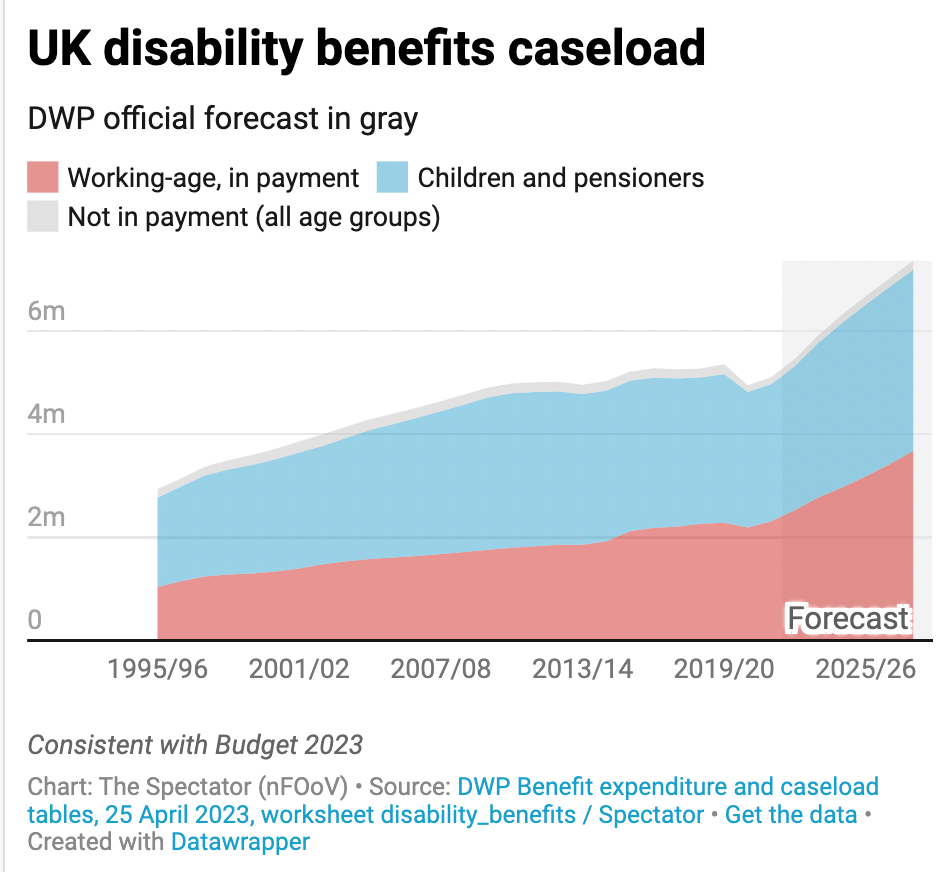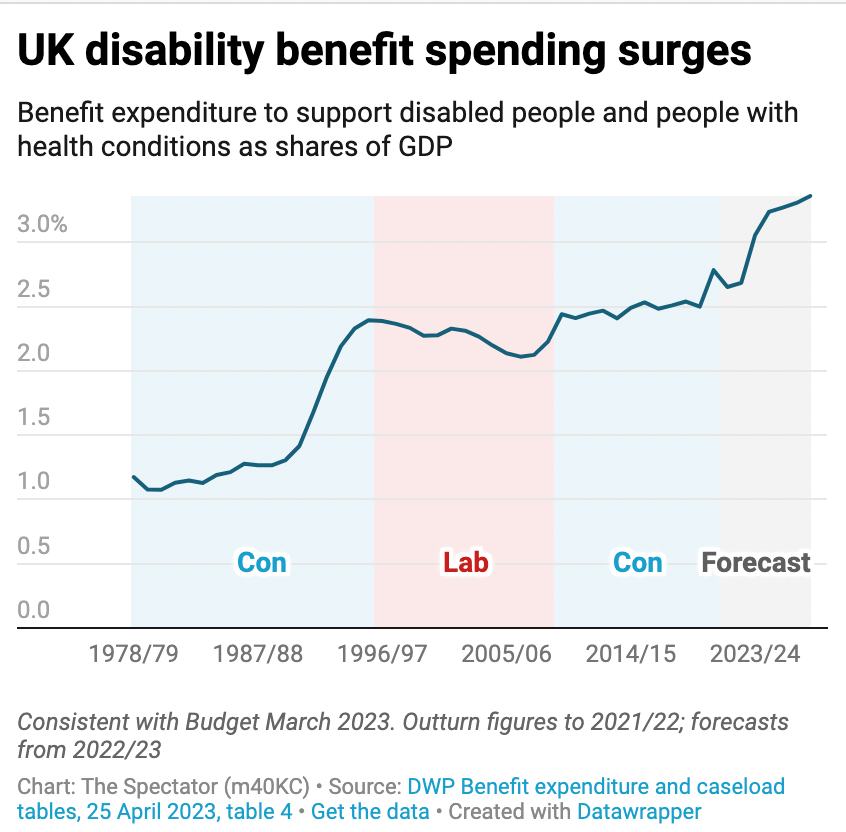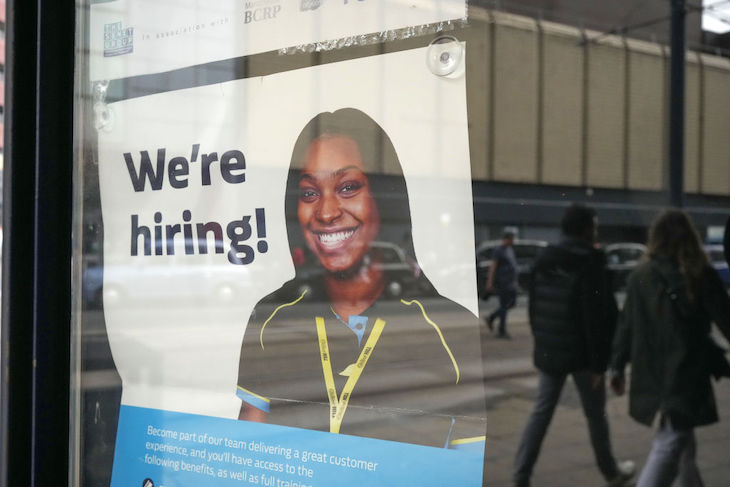When researching The Spectator cover story last week, we came across a figure so shocking that I felt it had to be wrong: that Manchester, a city where 40,000 job vacancies are currently being offered, has an unemployment rate of 18 per cent. That is to say: almost one in five of the working-age population in the city (excluding kids and pensioners) is claiming some kind of out-of-work benefits (including incapacity benefits). Not salary-tops, not supplementary welfare but benefits given to those who are not in work. In the middle of a worker shortage crisis, it’s quite the scandal.
But one you will not have heard of because the figure is not produced by the government. You have to delve into the Department for Work and Pensions’ (DWP) StateXplore database, look up table six to find Manchester’s total (69,985), then divide against its working-age population (385,000) which is on separate tables (full methodology here): fact-checkers, please knock yourselves out. Sadly, our figures do seem to be right.
Here’s what they look like on a nationwide level, both from 1979 and from 2000. The latest movement is an uptick.

And yes, this figure has been high before – but that was in a recession, with very few jobs around. The Tories have somehow managed to combine mass joblessness with mass worker shortages, a new category of welfare dysfunction. The national figure, which we at The Spectator have been publishing for some time on a lonely and so far unsuccessful campaign to highlight the problem, can seem so large as to be discombobulating. That’s why, in my cover story this week, we zeroed in on Manchester. As I argue:
‘Manchester is desperate for workers. There are 40,000 jobs advertised in the city at the moment, at every pay grade. Ann Summers wants a stockroom assistant (£10.70 an hour), or you could invigilate exams at £14 an hour or post videos on TikTok for £20 an hour. Sellcheck Chemicals is offering up to £75,000 a year for a sales manager (‘No biology background needed, no previous experience necessary’). Even the army is offering trainee officers £34,000 after their first year. But ask any employer in the city what it’s like hiring and they’ll tell you: it’s a battle.‘
Manchester is a magnificent city which oozes vibrancy; it’s not down-at-heel. And yet under this Tory government that I have tended to support, we manage to have almost one in five of the people you’d see walking around the place on the dole? Yes, many are categorised as too sick to work: some actually will be. But what percentage of the working-age in that city are genuinely incapable of doing any work? I suspect the figure is a good deal lower than 18 per cent. Hence a staggering waste of human potential, let alone taxpayers’ money. Retarding Manchester’s economic progress.
The UK has been thrown into crisis
I was at a reception in Westminster this week to mark the anniversary of Policy in Practise, a consultancy that has done huge amounts of good by producing systems than help individuals and councils navigate the maze of welfare benefits. Guy Opperman, the welfare minister, spoke, as did Jonathan Ashworth, the shadow secretary for work and pensions. Ashworth said he hoped to be a ‘reforming’ DWP secretary: he’d have to be, because keeping five million on benefits and relying on mass immigration to grow the workforce is a recipe for national sclerosis. My hunch is that, because this has not made it on to Sunak’s five pledges, it’s being ignored. And it’s ignorable, too. The worst of the welfare dysfunction is affecting the sort of communities that rarely make it into the news.
At that reception I got talking to the great Nicholas Timmins, whose history of the welfare state I suggest to every new Spectator recruit trying to understand the country we journalists end up chronicling. Universal Credit was an improvement for those seeking work, he said, but goalposts move: the problem now is people, often citing mental health issues, claiming sickness and disability benefit.
My own hunch on what’s going on: the UK system has been thrown into crisis by such claims and has no idea how to properly process a mental health claim. So we end up with 5,000 people a day – a day! – claiming sickness benefit. When people are signing on at twice the rate they were pre-lockdown, it’s a sick of something pretty major having gone wrong. Ashworth suggested that evening that the rise in musculoskeletal incapacity claims may be related to home working during lockdown.
This issue has almost no political salience, no champion, no agenda. Which is odd, when you think of how much of the country – and how many of our countrymen – are affected. Ashworth will talk about the general need to reform, but Labour as a party feels uncomfortable talking about high welfare numbers as a problem in and of itself.
The Tories do talk about the need to get people back on work, but the DWP publishes caseload projections for years into the future – and it is bracing for failure on a truly epic scale. I’ve seen this graph several times and still do a double-take when looking at the y-axis: yes, we are talking about millions of people.

So the waste of lives is one thing – but the waste of money is something else. The below DWP official forecast chart, which we have just graphed up, is also an absolute scandal that should cause outrage. But it doesn’t because no one ever looks at DWP forecasts.
Labour seems like the party that might get this under control. The Tory plan, going into the future, would see the amount of tax money spent on disability benefit leaping massively.

The Tories went through a phase, under Iain Duncan Smith, of saying they were in the business of saving lives rather than saving money: and as the massive dip in the total benefits chart shows, they made big progress. But that progress was destroyed by the lockdowns and the whole mission of welfare reform needs to begin again. To deal with a problem, it’s first necessary to recognise and speak frankly about the problem. And the Tories seem to be some way away from that.
Got something to add? Join the discussion and comment below.
Get 10 issues for just $10
Subscribe to The Spectator Australia today for the next 10 magazine issues, plus full online access, for just $10.





















Comments
Don't miss out
Join the conversation with other Spectator Australia readers. Subscribe to leave a comment.
SUBSCRIBEAlready a subscriber? Log in